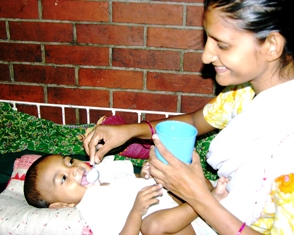Visiting World Health Leader Promotes Broad Agenda for Poor
May - June, 2008 | Volume 7, Issue 3
Bangladesh, once emblematic of poverty and pity, has made great strides in public health due to international collaboration on disease-prevention, family planning and child nutrition, says Dr. Alejandro Cravioto, the new executive director of the world-famous International Centre for Diarrheal Disease Research (ICDDR, B) in Dhaka.

Dr. Alejandro Cravioto has been head of the
International Centre for Diarrheal Disease
Research (ICDDR, B) in Dhaka since last year. In
collaboration with partners like Fogarty, the
Centre conducts research, training and program
activities.
Due to early assistance from NIH researchers, continuing today with collaboration with Fogarty, the Centre pioneered development of oral rehydration treatment to combat the deadly effects of diarrhea in infants and young children.
Although digestive and other infectious diseases remain prevalent, Cravioto said in a Fogarty-sponsored lecture that new and important goals for improving health in countries like Bangladesh include population control education, providing zinc supplements to young children and working on new vaccines.
Fogarty Director Dr. Roger I. Glass, a longtime colleague of Cravioto and himself an expert in the rotavirus that causes diarrhea, noted that NIH infectious disease experts were among the first scientists to work at the Centre after its creation in 1960 to combat endemic cholera. Today, Fogarty supports more than two dozen collaborative efforts with the ICDDR, B. The problems of the country that went through political upheaval, violence and floods has a population of 150 million in about the size of Iowa. The number of people is about 30 million fewer than might have been now were it not for ICDDR, B population control efforts, said Cravioto, who was trained in his native Mexico.

Oral rehydration therapy, makes it
possible for mothers to administer a
simple sugar and salt solution, as shown
here in Bangladesh in 2006.
Photo: ICDDR, B
Cravioto said the Centre has moved beyond treating infectious diseases to conduct research on public health, maternal and child health, domestic violence and empowerment of women, adolescent health, problems of the poor and, now, chronic diseases. One puzzle, he said, is the unusual level of heart disease in men under 50 in Bangladesh, even though they have a "lean" phenotype and eat a diet of rice, lentil, fish and vegetables.
He said the broadened reach and success of ICDDR, B was due to reliance on multiple donors instead of one single large benefactor, collaboration among scientists from many countries and its independence from government control.
Currently, 40 percent of the funding comes from international development agencies, with the rest coming from competitive service grants, Cravioto said.
To view Adobe PDF files,
download current, free accessible plug-ins from Adobe's website.